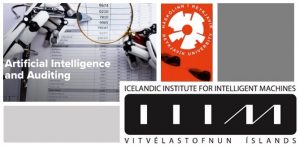Dr. Páll Ríkharðsson and Dr. Kristinn R. Thórisson recently presented the conclusions of their year-long analysis on the opportunities of using artificial intelligence (AI) in auditing. Titled Artificial Intelligence and Auditing in SMEs: Attitudes, Expectations and Applications, the hour-long seminar (see the whole recording here) was based on research by the Icelandic Institute for Intelligent Machines (IIIM) and Department of Business Administration at Reykjavik University (RU) for the Association of State Authorized Auditors, analyzing attitudes towards automation and AI, as well as  threats and opportunities for its use in auditing. The report answers questions about the practical use of advanced machine learning and other technologies for speeding up, simplifying, reducing the cost of, and improving, standard operations of auditors across a wide range of companies.
threats and opportunities for its use in auditing. The report answers questions about the practical use of advanced machine learning and other technologies for speeding up, simplifying, reducing the cost of, and improving, standard operations of auditors across a wide range of companies.
The work focused specifically on small and medium-sized enterprises (SMEs), guided by two main research questions: Firstly, the expectations of “everyday” auditors towards AI applications in their field, including expectations concerning its potential impact on their performance, job focus, and career; and secondly, questions about what AI applications might currently benefit their work.
In less populated countries like Iceland, all organisations can be considered “small or medium-sized”, and SMEs make up the largest percentage of Icelandic auditing firms’ customers. If smaller countries aim to participate in the Fourth Industrial Revolution, Dr. Thórisson emphasized the importance of keeping the temporal gap between automation-related research and the actual application and use of AI as short as possible, through a concerted effort to make AI part of the companies’ “known tech”.
Others that worked on the report are Gudmundur Begthorsson at Prudent-Advisory and Hjörleifur Rörbeck, IIIM. Atli Þór Jóhannsson, a partner of PwC Iceland, joined Dr. Ríkharðsson and Dr. Thórisson in the seminar.
